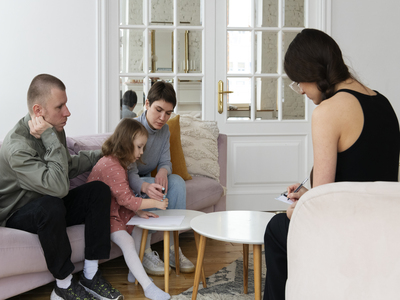For anyone who has witnessed a loved one struggle with alcohol abuse, the pain and heartache that accompanies it are all too familiar. The path of addiction is a difficult one, not just for the person grappling with it, but also for the family members who must bear witness to their loved one’s suffering. Feelings of helplessness, confusion, and frustration can become an overwhelming burden as the family is left to pick up the pieces, trying to mend the frayed edges of their once harmonious fabric.
To help you get through this, we are going to explore the many ways in which alcohol abuse affects the family unit. We will delve into the emotional turmoil, strained relationships, financial hardships, and the potential cycle of abuse that may arise, all while offering empathy and understanding for the families navigating this challenging journey. Recognizing that addiction is a complex and multifaceted issue, we will also emphasize the importance of hope, healing, and support, as these are vital threads that can help to reweave the fabric of the family and strengthen the connections between its members.

Understanding the Role of Alcohol in the Family

Alcohol consumption is a common practice across cultures and is often seen as a social lubricant that helps bring people together. However, when alcohol use turns into abuse, it morphs into a destructive force that can tear families apart.
For the person struggling with alcohol abuse, it may seem like a solitary battle. In reality, the repercussions of their addiction extend far beyond their personal experiences, touching the lives of their loved ones in ways both visible and hidden.
Emotional Turmoil and the Breakdown of Trust
One of the most profound effects of alcohol abuse on the family is the emotional turmoil it creates. Family members may experience a wide range of emotions, from anger and frustration to sadness and despair. The person suffering from alcohol abuse may become unpredictable, causing tension and uncertainty in the household. This unpredictability can lead to a breakdown of trust, as loved ones may feel betrayed or let down by the individual’s broken promises and unreliability.
Children, in particular, can be deeply affected by a parent’s alcohol abuse. They may feel confused, scared, or guilty, thinking that they are somehow responsible for their parent’s addiction. These emotions can have long-lasting implications on a child’s mental health and well-being, potentially leading to issues such as anxiety, depression, or even the development of their own substance use disorders.
Strained Relationships and Communication
Alcohol abuse can create a barrier between the person struggling with addiction and their family members, making it difficult for them to communicate openly and honestly.
Conversations may become riddled with arguments, misunderstandings, and hurt feelings. In some cases, family members may avoid discussing the issue altogether, leading to a breakdown in communication and further isolation.
As relationships become strained, family members may find themselves withdrawing from one another. This withdrawal can create a sense of loneliness and disconnect, further exacerbating the challenges faced by both the individual with alcohol abuse and their loved ones.
Financial Hardships
Alcohol abuse can lead to significant financial problems for the family. The cost of maintaining a substance use disorder can quickly add up, potentially leading to job loss, debt, or even bankruptcy. Financial struggles can place an additional burden on the family, as they are forced to navigate the stresses of managing money while also dealing with the emotional fallout of the addiction.
In some cases, these financial hardships may require family members to make difficult choices, such as cutting back on necessities or putting their own needs and aspirations on hold. This can lead to feelings of resentment and frustration, further straining relationships within the family.
The Cycle of Abuse
Unfortunately, alcohol abuse can sometimes be part of a larger cycle of abuse within the family. In some cases, the person struggling with addiction may become verbally or physically abusive towards their loved ones. This can create an environment of fear and instability, particularly for children who are more vulnerable to the effects of abuse.
Moreover, children who grow up witnessing alcohol abuse and its accompanying consequences are at an increased risk of developing their own substance use disorders later in life. This perpetuates a cycle of addiction, as the trauma and pain experienced in childhood can carry over into adulthood and manifest in the form of substance abuse.
Healing and Hope

While the effects of alcohol abuse on the family can be devastating, it is essential to remember that there is hope. With the right support and resources, individuals struggling with addiction and their families can work together to heal and rebuild their relationships. It is crucial to approach the situation with empathy and understanding, as healing is a journey that requires patience, compassion, and a commitment to change.
Seeking professional help is often the first step towards recovery. A combination of individual therapy, family counseling, and support groups can provide the tools needed to navigate the road to sobriety. Engaging the entire family in the recovery process can foster a supportive environment, allowing each member to address their own feelings, fears, and concerns, and work towards healing together.
Open communication is vital during the recovery process. Encourage honest and non-judgmental conversations, allowing each family member to express their thoughts and feelings about the addiction and its impact on their lives. This can help to rebuild trust and understanding, fostering a more connected and resilient family unit.
Self-care is also essential for both the person struggling with addiction and their family members. Recognize the importance of setting boundaries and prioritizing personal well-being. This can help to ensure that the family can support one another effectively without sacrificing their own needs in the process.
Conclusion
Alcohol abuse can have far-reaching effects on the family, touching every aspect of life and straining the bonds that tie loved ones together. However, it is essential to remember that healing is possible, and with the right support and resources, families can emerge from the darkness of addiction stronger and more united than before. By fostering empathy, open communication, and a commitment to change, the ripple effect of alcohol abuse can be transformed into a powerful force for healing and growth.




